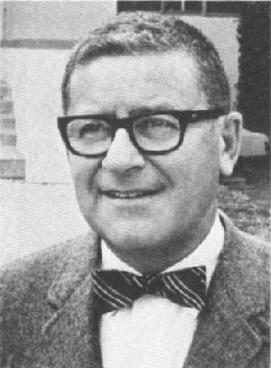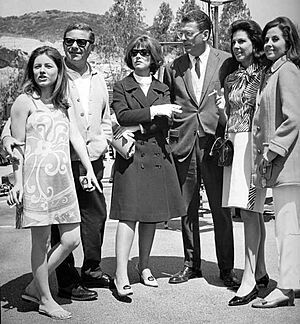Mark Robson (film director) facts for kids
Quick facts for kids
Mark Robson
|
|
|---|---|
 |
|
| Born | 4 December 1913 |
| Died | 20 June 1978 (aged 64) |
| Resting place | Mount Sinai Memorial Park Cemetery, Los Angeles, California, U.S. |
| Nationality | Canadian American |
| Alma mater | UC Los Angeles Pacific Coast University |
| Occupation | Film director, producer, editor |
| Years active | 1941–1978 |
| Spouse(s) |
Sarah Naomi Riskind
(m. 1936) |
| Children | 3 |
Mark Robson (born December 4, 1913 – died June 20, 1978) was a talented Canadian-American filmmaker. He worked as a film director, producer, and editor. Robson spent 45 years working in Hollywood, starting as a film editor. Later, he became a well-known director and producer.
He directed 34 movies during his career. Some of his famous films include Champion (1949), The Bridges at Toko-Ri (1954), Peyton Place (1957), and Earthquake (1974).
Robson was nominated twice for the Academy Award for Best Director. These nominations were for his movies Peyton Place and The Inn of the Sixth Happiness. He also received four nominations for the Directors Guild of America Award. In 1960, he earned a star on the famous Hollywood Walk of Fame. This star honors his important work in the movie industry.
Contents
Early Life and Education
Mark Robson was born in Montreal, Canada. He went to Roslyn Elementary School and Westmount High School in Montreal. After high school, he studied at the University of California, Los Angeles (UCLA). He also attended Pacific Coast University School of Law.
After his studies, Robson found a job at 20th Century Fox studios. He worked in the prop department, which handles all the objects used in movies. Later, he moved to RKO Pictures, another big movie studio. There, he began training to become a film editor.
Mark Robson's Career in Film
Starting as a Film Editor
In 1940, Mark Robson worked as an assistant editor. He helped Robert Wise edit the movie Citizen Kane. This film was the first movie directed by Orson Welles. It is considered one of the greatest films ever made.
Robson and Wise also edited Welles' next movie, The Magnificent Ambersons (1942). They had to make big changes to the end of the film. Orson Welles did not agree with these changes.
Robson then became the main editor for The Falcon's Brother (1942). This was a "B picture" from RKO, meaning it was a lower-budget film. He also edited Journey into Fear (1943). This movie was made by Orson Welles' company, but Welles was not involved in the editing.
Working with Val Lewton
Mark Robson and Robert Wise both got a big break thanks to producer Val Lewton. Lewton was in charge of making a series of low-budget horror films at RKO. These films later became very famous.
Robson edited two of Lewton's early horror films. These were I Walked with a Zombie (1943) and The Leopard Man (1943). Both were directed by Jacques Tourneur.
Becoming a Director
Val Lewton was very impressed with Robson's editing skills. Because of this, he gave Robson his first chance to direct a movie. This film was The Seventh Victim (1943). Lewton liked the movie, so Robson directed another film for him, The Ghost Ship (1943). Lewton also gave Robert Wise his first directing job.
Lewton wanted to make different kinds of movies, not just horror. RKO allowed him to make Youth Runs Wild (1944). This movie was about young people getting into trouble. Robson directed it, but it was not a big success.
More popular was Isle of the Dead (1945). This film starred the famous horror actor Boris Karloff. Lewton, Karloff, and Robson worked together again on Bedlam (1946). This movie did not make much money. It was the last horror film that Val Lewton produced.
Moving to Bigger Projects
Mark Robson's success at RKO led him to work on larger movie projects. In 1949, he was nominated for a Directors Guild of America award. This was for his work on the crime film Champion. This movie was produced by Stanley Kramer.
Robson directed another film for Kramer called Home of the Brave (1949). This was one of the first movies to talk about the serious issue of racism.
Next, Robson directed Roughshod (1949), a Western movie for RKO. He also directed My Foolish Heart (1949), a drama for producer Sam Goldwyn. Goldwyn then hired Robson for Edge of Doom (1950) and I Want You (1951). Robson later said this time working with Goldwyn was "one of the worst periods of my career."
At Universal Pictures, Robson made Bright Victory (1951). This film was about a blind soldier.
Robson and Robert Wise briefly worked together to produce films and TV shows. However, Robson later ended the partnership with Val Lewton. Robson and Wise produced Return to Paradise (1953), starring Gary Cooper. For Warwick Films, Robson directed Alan Ladd in Hell Below Zero (1954).
He made a comedy called Phffft (1954) at Columbia Pictures. Then, he had one of his biggest hits with The Bridges at Toko-Ri (1954). This movie earned him another DGA nomination. Warwick Films hired him again for A Prize of Gold (1955). He went to MGM to make Trial (1955). His boxing film, The Harder They Fall (1956), was based on a book.
The Little Hut (1957) was a huge success for MGM. Even more popular was Peyton Place (1957), made for 20th Century Fox. Robson was nominated for an Academy Award for Best Director for Peyton Place. He was nominated again the next year for directing Ingrid Bergman in The Inn of the Sixth Happiness. These films also earned him his third and fourth Directors Guild of America nominations.

Producing and Directing
Robson produced and directed From the Terrace (1960), which starred Paul Newman. He also produced The Inspector (1962). He directed and produced Nine Hours to Rama (1963). After making that film, Robson left 20th Century Fox after working there for five years.
Robson and Newman worked together again on The Prize (1963) for MGM. It was a successful movie. So was Von Ryan's Express (1965), starring Frank Sinatra, which was made back at Fox.
Robson produced and directed Lost Command (1966). This movie was about the French Foreign Legion. He also directed Valley of the Dolls (1967). Critics did not like this film, but it was very popular and made a lot of money at the box office.
Later Films
Robson made a few films that were not as successful. These included Daddy's Gone A-Hunting (1969), Happy Birthday, Wanda June (1971), and Limbo (1972). In 1974, he directed Earthquake. This movie was famous for introducing "Sensurround", a special sound system that made viewers feel the rumbling of the earthquake.
Personal Life
Mark Robson was married to Sarah Naomi Riskind starting in 1936. They remained married until his death on June 20, 1978. He passed away from a heart attack in London. He had just finished directing the movie Avalanche Express, which was released a year after he died. Mark and Sarah had three children together.
Robson is buried at Mount Sinai Memorial Park Cemetery in Los Angeles. For his important work in the movie industry, he has a star on the Hollywood Walk of Fame. You can find it at 1722 Vine Street.
Filmography
Editor
- Citizen Kane (1941, assistant editor, uncredited)
- The Magnificent Ambersons (1942, assistant editor, uncredited)
- Mail Trouble (1942)
- The Falcon's Brother (1942)
- Cat People (1942)
- Journey into Fear (1943)
- I Walked with a Zombie (1943)
- The Leopard Man (1943)
Director
- The Seventh Victim (1943)
- The Ghost Ship (1943)
- Youth Runs Wild (1944)
- Isle of the Dead (1945)
- Bedlam (1946, also screenwriter)
- Champion (1949)
- Roughshod (1949)
- Home of the Brave (1949)
- My Foolish Heart (1949)
- Edge of Doom (1950)
- Bright Victory (1951)
- I Want You (1951)
- Return to Paradise (1953, also producer)
- Hell Below Zero (1954)
- Phffft (1954)
- The Bridges at Toko-Ri (1955)
- A Prize of Gold (1955)
- Trial (1955)
- The Harder They Fall (1956)
- The Little Hut (1957, also producer)
- Peyton Place (1957)
- The Inn of the Sixth Happiness (1958)
- From the Terrace (1960, also producer)
- The Inspector (1962, producer only)
- Nine Hours to Rama (1963, also producer)
- The Prize (1963)
- Von Ryan's Express (1965)
- Lost Command (1966, also producer)
- Valley of the Dolls (1967, also producer)
- Daddy's Gone A-Hunting (1969, also producer)
- Happy Birthday, Wanda June (1971, also producer)
- Limbo (1972)
- Earthquake (1974, also producer)
- Avalanche Express (1979, also producer)
See also
 In Spanish: Mark Robson para niños
In Spanish: Mark Robson para niños

